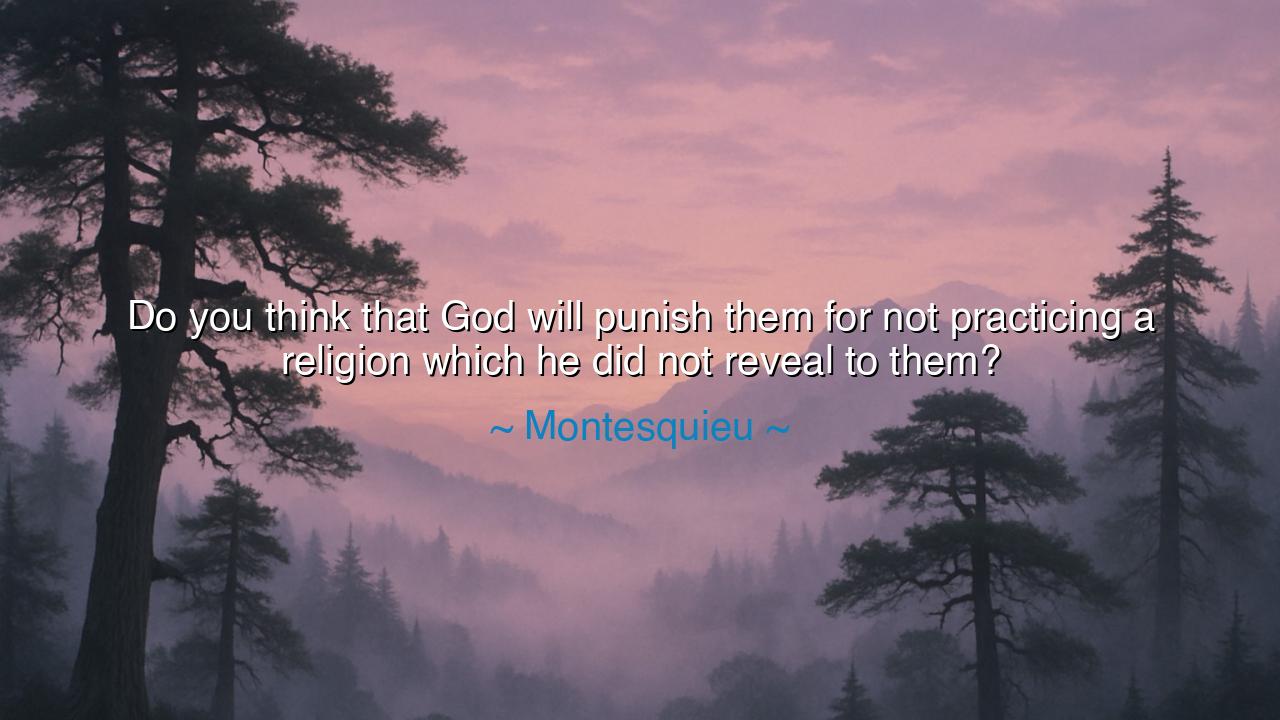
Do you think that God will punish them for not practicing a
Do you think that God will punish them for not practicing a religion which he did not reveal to them?






"Do you think that God will punish them for not practicing a religion which he did not reveal to them?" This profound question, posed by Montesquieu, delves into the heart of justice, faith, and the nature of divine will. Montesquieu, the 18th-century French philosopher, was not only concerned with the workings of human societies and governments, but also with the very foundations of religious belief and morality. In this quote, he challenges the assumptions of religious authority and the divine justice that underpins much of humanity’s understanding of salvation. He asks whether it is fair for God to punish individuals for following paths of belief that were not revealed to them—a question that touches on the essence of divine mercy and human responsibility.
In the ancient world, this same question would have been considered deeply. Socrates, the father of Western philosophy, often explored the tension between divine will and human understanding. He famously argued that virtue could not be imposed by law alone, and that a person’s moral compass must be grounded in their own understanding of the good. Socrates believed that justice was not a matter of following rituals or dogma but of acting in accordance with reason and virtue, principles which he saw as universally accessible. Similarly, the Romans believed that all people, even those outside the Roman Empire, could live justly by following natural law—the idea that reason itself could lead individuals to righteous behavior, even if they did not practice the same religious rites as the Romans.
Montesquieu’s question highlights a key concern: religion is often framed by those in power as the sole means of securing salvation or divine favor. Yet, how can those who have never encountered a particular faith be expected to follow it? This injustice of imposing a single religious practice on all, without regard to individual context, was a point of reflection in Christianity as well. The early Church grappled with the question of salvation for those who had never heard of Christ, leading to debates that still echo today. Augustine of Hippo famously posited that it was the grace of God that would decide the fate of those who had never encountered Christianity, suggesting that God’s mercy could extend beyond human understanding. Montesquieu’s question can be seen as an extension of this debate—a plea for divine justice that is not bound by the limits of human-made institutions.
Real-life examples, too, underscore this moral dilemma. Mahatma Gandhi, while deeply spiritual and influenced by Hinduism, was critical of any religious system that claimed sole access to truth. Gandhi believed that God could be found in all faiths, and that the moral and spiritual essence of humanity transcended religious boundaries. His life was a testament to this belief: though he was raised in the Hindu tradition, he respected and embraced the wisdom of Christianity, Islam, and other faiths, seeing in them the same core values of truth, compassion, and peace. Gandhi’s approach to religion echoes the essence of Montesquieu’s question: if God is universal and just, how can He punish those who have not received the revelations of any particular faith?
Similarly, the history of religious tolerance in certain civilizations reveals a deeper understanding of the divine. The Islamic Golden Age, particularly under the Abbasid Caliphate, is often cited as a period where scholars, philosophers, and religious leaders of different backgrounds lived in relative harmony. Muslims, Christians, and Jews worked together to advance knowledge, seeing each other not as heretics but as fellow seekers of truth. This understanding reflects the idea that God is not confined to one particular path, and that truth can be found through the pursuit of wisdom, justice, and goodness, irrespective of religious affiliation.
The lesson from Montesquieu’s question, then, is not only about the nature of divine justice, but also about the importance of tolerance and respect for the diverse ways in which people seek the divine. It calls us to reflect on the universality of moral values—compassion, love, integrity—and to recognize that spirituality is deeply personal, shaped by culture, context, and individual experience. If God is indeed merciful and just, then surely salvation is not confined to those who follow one prescribed way, but is open to all who live in accordance with their highest moral ideals.
In our own lives, we must embrace this broader view of spirituality. Religious tolerance is not merely about coexistence but about recognizing the dignity and worth of all human beings, regardless of the path they follow. Let us learn to respect the differences in belief and practice, understanding that the divine transcends human-made boundaries. In doing so, we create a more compassionate world, one where justice is not limited to one religious system but extended to all who seek to live in accordance with the good. Let us move forward with the knowledge that God’s mercy is vast, and His love is not confined to any one tradition, but is open to all who seek peace, justice, and truth.






AAdministratorAdministrator
Welcome, honored guests. Please leave a comment, we will respond soon